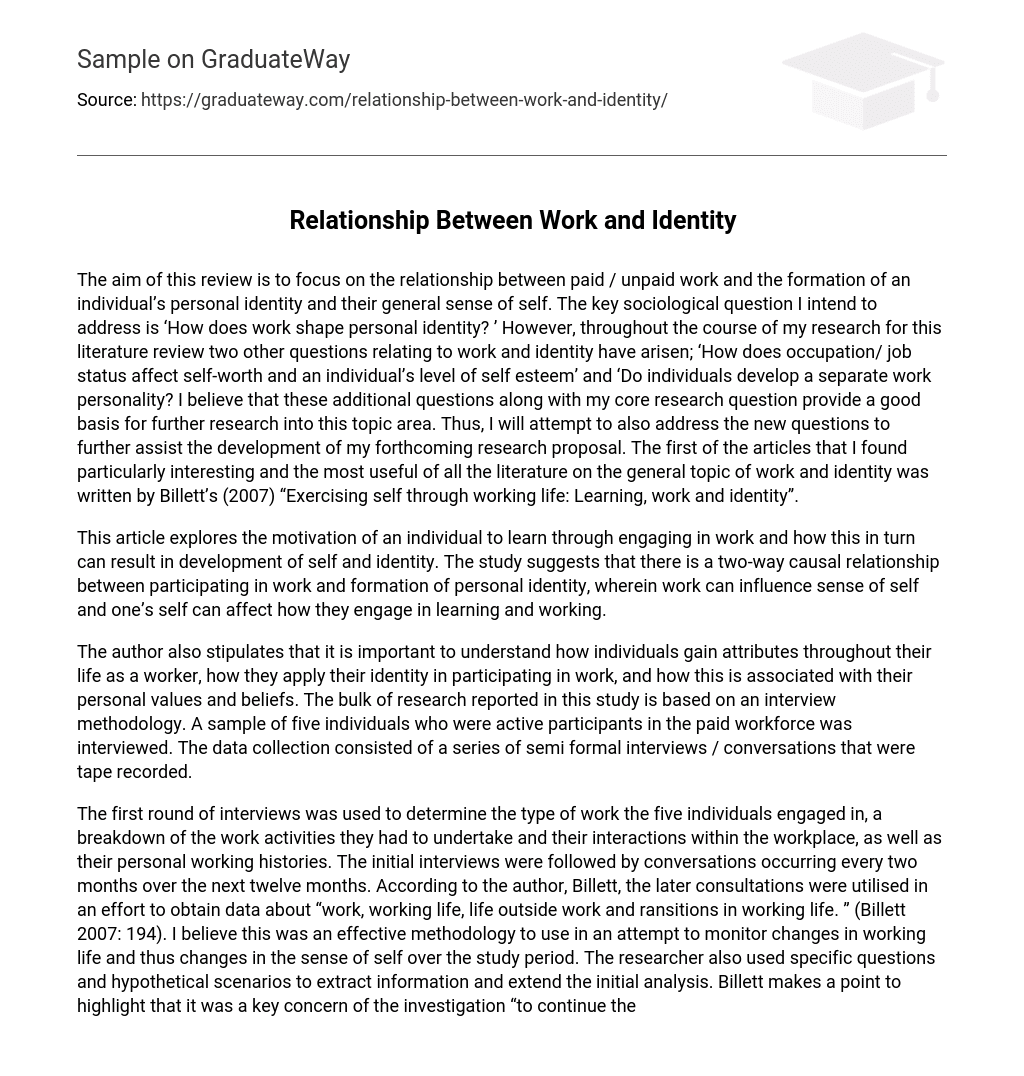This literature review examines the connection between paid and unpaid work and its impact on an individual’s personal identity and sense of self. The primary sociological inquiry centers around comprehending how work influences personal identity. However, during the research process for this literature review, two additional questions emerged regarding the effects of occupation/job status on an individual’s self-worth and level of self-esteem, as well as the formation of a distinct work personality. These supplementary inquiries, along with the main research question, provide a solid foundation for further investigation in this field. As a result, I will also address these newfound questions to support the development of my upcoming research proposal. Amidst various articles encountered, one particularly captivating and valuable contribution to the broader topic of work and identity is Billett’s (2007) article titled “Exercising self through working life: learning, work, and identity.”
This article discusses the relationship between work and personal growth, specifically focusing on how individuals are motivated to learn through their involvement in work. Research suggests that engaging in work can shape our identity, while our self-perception also affects how we approach learning and work.
The author emphasizes the significance of comprehending how individuals cultivate skills and qualities as workers throughout their lives, how they incorporate their identity into their work, and how this relates to their personal values and beliefs. The study primarily involved conducting interviews. A sample group of five employed individuals was selected for participation, and they were interviewed through a sequence of semi-formal recorded conversations.
The initial round of interviews aimed to collect information about the participants’ work, job tasks, workplace interactions, and their personal work histories. Subsequent conversations occurred every two months for a year and focused on different aspects of work, working life, life outside of work, and transitions in working life. This methodology allowed for tracking changes in working life and personal identity over time. In addition to specific questions and hypothetical scenarios, the researcher used them to gather additional information and enhance the initial analysis. It was crucial for the investigation to continue refining and expanding the data collected throughout the year. This approach strengthens the study and supports the argument that learning through work impacts an individual’s evolving personality and identity. In terms of an overall critique of Billett’s study from a sociological perspective, it is considered significant in terms of understanding how work influences our sense of self despite lacking explicit explanations.
The article by Walsh and Gordon (2008) focuses on the development of personal work identities and how they contribute to a person’s overall identity. Previous research on social and work identity is used to examine how individuals create their own work identities. The authors define work identity as a combination of organizational, occupational, and other identities that impact the roles people assume and how they behave in their work (Walsh & Gordon 2008: 46). The study demonstrates how a person’s identification with their paid or unpaid occupation shapes their specific work identity. The authors primarily used secondary analysis in their study, which helped to consolidate and expand our understanding of previous research on work identities. This method was advantageous because their research is mostly qualitative in nature.
By conducting their research in this way, they were able to gain cost and timing advantages. Additionally, the existing data bank they used would likely contain higher-quality data compared to what a single study could obtain. It is worth mentioning that Walsh and Gordon acknowledge the limitations of ‘work identity’ research in their article, further strengthening their argument.
According to Walsh & Gordon (2008: 58), work identity plays a significant role in the overall identity of adults. However, little research has been conducted on individual work identity and how it influences people’s thoughts and actions in the workplace. While the two articles mentioned in this text offer valuable information on the connection between work and identity, previous studies in this research area are broad and there is limited recent literature available on my specific research question.
The current findings imply the need for additional research on the impact of work on personal identity formation, or the need to explore a slightly different area of investigation for my larger research proposal. While searching for readings for this literature review, it became clear that there has been more research conducted on the creation of a distinct work personality rather than the chosen topic of how work influences an individual’s personal identity and overall self-perception.
Through researching the readings in the bibliography, I have found that work determines personal identity in terms of class and status. Being acknowledged as a valuable member of society is vital for shaping one’s identity. Therefore, based on this literature review, I will need to include these newly identified concerns in my final research proposal, albeit briefly.





